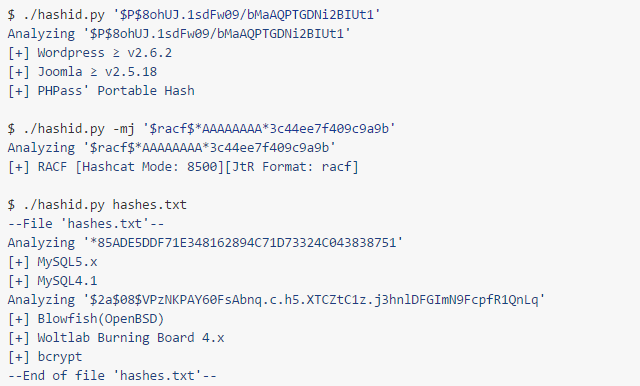[ad_1]
hashID is a tool to help you identify different types of hashes used to encrypt data, especially passwords. It’s written in Python 3 and supports the identification of over 220 unique hash types using regular expressions.

hashID is able to identify a single hash, parse a file or read multiple files in a directory and identify the hashes within them. hashID is also capable of including the corresponding hashcat mode and/or JohnTheRipper format in its output.
There are other similar tools like hash-identifier, which is outdated and this claims to replace. And the original HashTag – Password Hash Type Identification (Identify Hashes) – which is even older.
And to be fair, this hasn’t been updated since 2015 either so yah.
Usage
|
$ ./hashid.py [–h] [–e] [–m] [–j] [–o FILE] [—version] INPUT
–e, —extended list all hash algorithms including salted passwords –m, —mode show corresponding hashcat mode in output –j, —john show corresponding JohnTheRipper format in output –o FILE, —outfile FILE write output to file (default: STDOUT) —help show help message and exit —version show program‘s version number and exit |
Installation
You can install, upgrade, uninstall hashID with these commands:
|
$ pip install hashid $ pip install —upgrade hashid $ pip uninstall hashid |
Or you can install by cloning the repository:
|
$ sudo apt–get install python3 git $ git clone https://github.com/psypanda/hashid.git $ cd hashid $ sudo install –g 0 –o 0 –m 0644 doc/man/hashid.7 /usr/share/man/man7/ $ sudo gzip /usr/share/man/man7/hashid.7 |
You can download hashID here:
Or read more here.
[ad_2]
Source link

